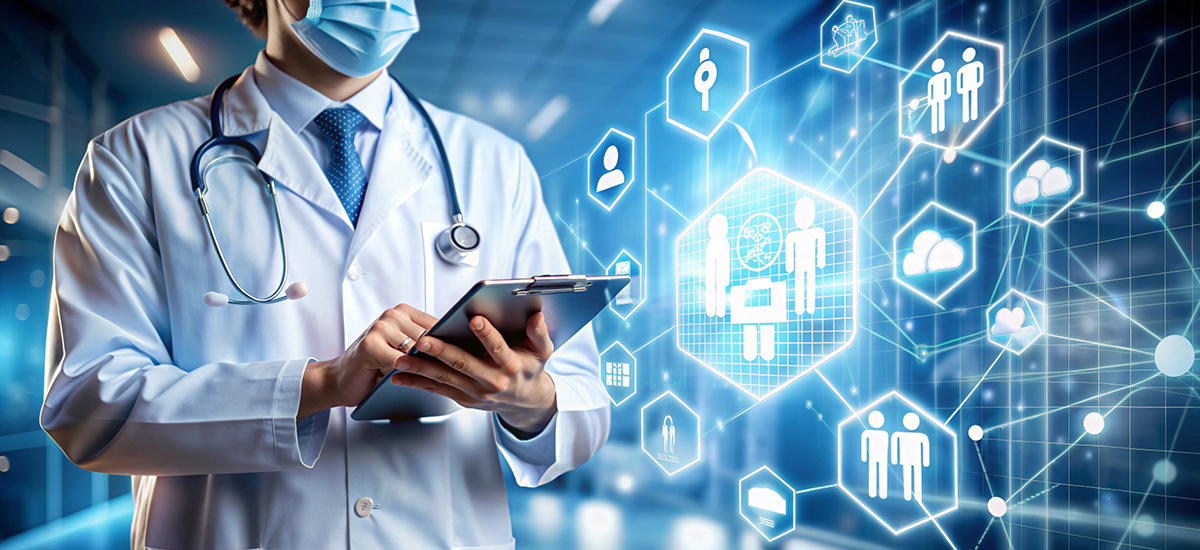
Listen to this blog
The healthcare, pharma, and life sciences industries are undergoing a profound transformation, driven by advancements in data and GenAI. At the heart of this evolution are the core stakeholders: patients and providers. Their evolving needs, expectations, and increasing reliance on technology are reshaping how healthcare is delivered, treatments are developed, and outcomes are improved.
Empowering patients: The era of personalized & proactive care
Today's patients expect and demand personalized, accessible, and proactive healthcare. They are more informed and engaged than ever before, with GenAI, digital health platforms, and wearables further facilitating this process.
AI-driven diagnostics & early detection: AI-powered tools analyze medical data to enable the early detection of diseases, creating opportunities for preventive care. For example, AI in radiology can identify abnormalities in medical images faster and more accurately than traditional methods.
Personalized medicine: Generative AI and precision medicine are revolutionizing treatment approaches by tailoring therapies to an individual’s genetic makeup, lifestyle, and clinical data.
Patient engagement & virtual care: AI-powered chatbots, remote monitoring tools, and digital health assistants enhance patient engagement by offering 24/7 support and facilitating virtual consultations.
Data ownership & health equity: With AI-driven platforms for patient data, ownership becomes more personal, leading to greater transparency in records and promoting equal access to care.
Empowering providers: AI-driven insights for better care delivery
The integration of GenAI has transformed how healthcare providers make informed clinical decisions, enhance operational efficiencies, and manage patient care.
Clinical decision support: AI amplifies the capabilities of doctors with real-time insights, reducing diagnostic errors and recommending treatment options by leveraging vast medical datasets.
Operational efficiency: AI automates administrative workflows, such as billing, claims processing, and patient scheduling, freeing up time for clinicians to focus on patient care.
AI in pharma & drug discovery: AI-powered research tools benefit providers by accelerating drug discovery, enhancing clinical trials, and optimizing treatment plans.
Predictive analytics for patient outcomes: AI models analyze patient data to predict risks, prevent complications, and offer personalized interventions, improving outcomes and cost efficiency.
Visionet’s GenAI Studio: Accelerating GenAI adoption and delivering ROI
While the Healthcare, Life Sciences, and Pharma industries stand to benefit greatly from GenAI, slow adoption persists due to outdated processes, complex integration, and underutilized data. Visionet’s GenAI Studio is helping enterprises tackle these challenges and accelerate GenAI adoption by seamlessly integrating AI into critical workflows and business processes. Whether it’s automating clinical documentation, enhancing patient engagement, or speeding up drug development, Visionet’s advanced platform enables rapid AI adoption with over 40 pre-built solutions, 36+ data connectors, and a scalable multi-cloud architecture.
Our GenAI solutions are specifically designed to drive ROI by delivering measurable improvements in workforce efficiency, cost reduction, and overall productivity. In just 8–11 weeks, organizations can achieve 18–21% workforce efficiency gains and reduce costs by 14–19%, driving significant value.
Let’s explore four key use cases that organizations can implement with Visionet GenAI Studio to enhance patient outcomes, streamline operations, and drive innovation.
Use Case 1: Assist clinicians
Gen AI is set to revolutionize clinical workflows by automating routine tasks like documentation, improving efficiency. It also provides real-time, data-driven insights, helping clinicians make faster, more informed decisions. According to McKinsey, automation in healthcare could save the industry up to $360 billion annually, primarily through improved efficiency in administrative tasks.
Examples:
Clinical summary generation: Automatically generate concise, structured summaries of patient visits, reducing the time clinicians spend on documentation, while improving accuracy and compliance.
Medical code extraction: Extract accurate ICD-10 codes from clinical notes, ensuring precise billing and minimizing claim denials.
Business benefits:
- Reduce overall coding costs with automated medical coding extraction.
- Minimize claim denials caused by erroneous medical coding.
- Ensure HIPAA compliance with 100% Azure cloud deployment.
- Seamlessly integrate with existing EMR/EHR systems.
Use Case 2: Healthcare support assistant
Gen AI-powered Healthcare Support Assistants empower patients by delivering personalized information, enhancing engagement and decision-making. They also streamline administrative tasks, reducing clinician workload and enabling more efficient, patient-focused care.
Examples:
Appointment agent for scheduling: Automate appointment booking by understanding patient preferences, availability, and doctor schedules, ensuring seamless coordination.
Medication agent for personalized information: Provide patients with detailed, tailored information about their prescribed medications, including dosage and potential side effects.
Virtual front desk assistant: A 24/7 digital assistant that handles patient inquiries about billing, appointments, and general health concerns, improving service efficiency.
Business benefits:
- Round-the-clock availability for quick issue resolution.
- Deliver accurate, personalized information to patients.
- Enhance productivity for healthcare professionals.
Use Case 3: GenAI-augmented CLS health website
Generative AI can transform how patients interact with healthcare websites by implementing advanced search functionalities that deliver personalized recommendations. This allows patients to find relevant healthcare providers quickly, thus improving overall satisfaction and engagement. According to a McKinsey survey, nearly 90% of patients who have used virtual care reported being satisfied with the service, displaying the effectiveness of virtual assistants in improving patient satisfaction score.
Examples:
Healthcare query system for doctor search: Use semantic search to match patients with the most relevant doctors based on specialty, location, and specific needs.
Multi-modal search for advanced queries: Enable patients to search using text, voice, or image inputs (e.g., uploading a prescription) for a more intuitive experience.
Integrated appointment scheduling tool: Allow users to book appointments directly after finding a suitable doctor, streamlining the patient journey.
Business benefits:
- Improved patient satisfaction through an intuitive search experience.
- Personalized and accurate doctor recommendations.
- Enhanced patient engagement through a more effective portal
Use Case 4: Conversational Data Intelligence
GenAI in Healthcare and Life Sciences empowers stakeholders with conversational data intelligence, allowing them to interact with structured data more intuitively. A Gen AI-powered conversational assistant helps quickly extracts actionable insights, enhancing decision-making and operational efficiency.
Examples:
Conversational data assistant for SQL queries: Users can ask natural language questions (e.g., "How many patients were admitted with respiratory issues last month?"), and the assistant instantly generates SQL queries to retrieve answers instantly.
Self-service data analysis tool: Empower non-technical users to perform complex data analysis tasks without needing IT support, democratizing access to insights.
Real-time insights extraction from databases: Enable stakeholders to get actionable insights on-demand by querying live databases through conversational interfaces.
Business benefits:
- Enables self-service data analysis across the board, reducing reliance on technical staff
- Help businesses tap into their data to make strategic decisions and explore new avenues for growth
Conclusion
As GenAI continues to transform Healthcare, Pharma, and Life Sciences, it’s unlocking new possibilities for better patient care and improved operational efficiency. To stay ahead in this rapidly evolving landscape, explore how Visionet’s GenAI services and solutions can help your organization accelerate GenAI adoption today.




